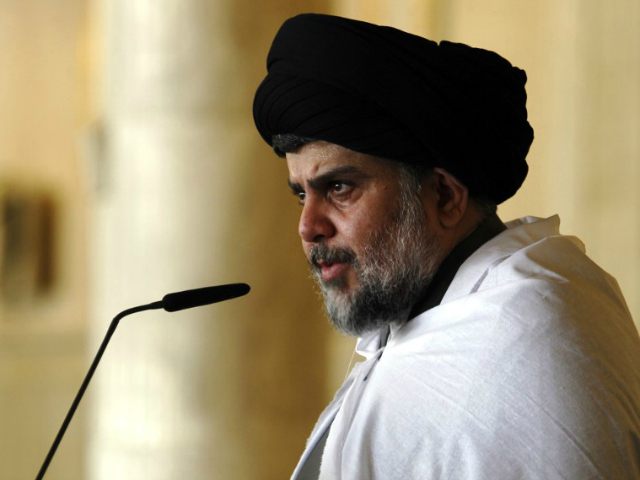It has to come to this: Muqtada Al Sadr, now more than ever, is calling the shots in Iraq.
Al Sadr, who came onto the scene as a nationalistic, anti-American leader fighting the U.S. during the war, is now the most influential politician in Iraq.
Al Sadr was disliked by the Americans as a fiery cleric advocating a fight. The fight at that time was against a foreign invading army. Some Iraqis rallied to his side, while others waited to see what changes might come about. Unfortunately, the promises the U.S. envisioned and pledged never materialized and Iraq has been a hotbed of violence, instability and poverty. So Al Sadr is now liked by the people because he is perceived to oppose the forces that have destabilized Iraq. He is viewed as a champion of Iraqi nationalism, with his grassroots party that is made up of working-class neighborhoods across Iraq’s Shia-populated cities.
Al Sadr now leads a populist movement, controls one of the biggest political blocs in parliament and commands a powerful militia. Though he is a religious man, hailing from a long line of Shiite scholars and well known and respected religious figures, he has also been involved in Iraqi politics. Recently, he withdrew his people from Parliament and with them his support for the current government that is not able or willing to affect change.
Over the weekend, Sadr summoned his people to storm the fortified and exclusive Green Zone to get a message across: it is time for changes, real ones that are long overdue. His followers streamed in, sat in the parliamentarians plush chairs, touched and felt power, and streamed back out. The people Al Sadr is speaking to are the majority Iraqi Shiites who were shunned, sidelined, and pushed back by years of Saddam Hussein pretending they did not exist. Their new political leaders, even the Shiites like them, have not done right by them, they feel. Iraqi politics has been a spider web of corruption, greed, and ethnic affiliations, they argue. Since the fall of Saddam Hussein until now, the political leaders have been exploiting the party quotas to bring in their people into positions they are not qualified to run.
On top of that, the protesters argue these politicians have had no interest in rebuilding Iraq or trying to improve the living standards of the majority of Iraqis who are still suffering from basic shortages and daily violence. The only sector in Iraq that continues to grow is the public sector – a massive 7 million plus mix of ghost and real employees being paid while domestic and international investment is non-existent. Foreign companies are not only derailed by the lack of security, but moreso by the rampant corruption that is endemic and costly. Iraq was just voted 161 least corrupt nation out of 175 countries, according to the 2015 Corruption Perceptions Index reported by Transparency International.
There needs to be an end to the bribes, corruption, the party hiring quotas, and the outlandish spending on security details and other perks that has reduced one of the richest countries to bankruptcy and poverty. With a depleted budget as a result of lower oil prices and the ongoing war against ISIS, things have worsened and quickly. The status quo cannot be maintained.
Is this an opportunistic move for Al Sadr? It is, but if it is an initial step towards leading a desperate country out of desperate situation, then what other choice is there? Sadr’s political life will always be intertwined with Iraq’s because of his religious and family history, so it would be best to manage his ambitions rather than shun him. It’s very clear he’s not going anywhere.
The U.S. wanted democracy for Iraq and here it is. It might not be in the company we wanted, but better for Iraq if old foes can turn into new allies.
Nadia Al Sultani, an international development professional having worked in Iraq, Afghanistan, Syria, and now Pakistan. She is the author of Baghdad Stories: An Iraqi-American Memoir. Al Sultani, an Iraqi-American, holds an MA in International Economics and spent several years working in international banking on Wall Street before beginning her career in public service.

COMMENTS
Please let us know if you're having issues with commenting.